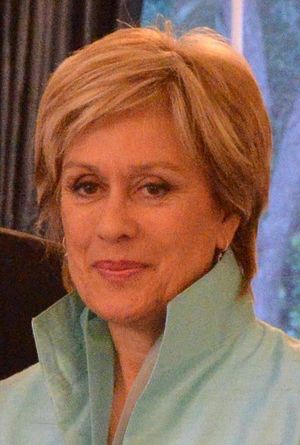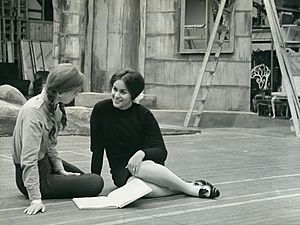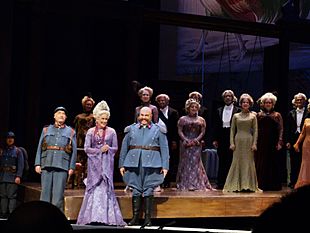Kiri Te Kanawa facts for kids
Quick facts for kids
Kiri Te Kanawa
|
|
|---|---|

Te Kanawa in 2013
|
|
| Born |
Claire Mary Teresa Rawstron
6 March 1944 Gisborne, New Zealand
|
| Occupation | Opera singer (soprano) |
| Years active | 1968–2017 |
| Spouse(s) |
Desmond Park
(m. 1967; div. 1997) |
| Children | 2 |
Dame Kiri Jeanette Claire Te Kanawa (born Claire Mary Teresa Rawstron on March 6, 1944) is a famous opera singer from New Zealand. She had a beautiful "lyric soprano" voice, which means it was clear, warm, and strong. People described her voice as "mellow yet vibrant, warm, ample and unforced."
She became famous around the world on December 1, 1971. This happened when she performed as the Countess in Mozart's opera Le nozze di Figaro at the Royal Opera House in London.
Kiri Te Kanawa was praised in many countries. She sang music from the 1600s, 1700s, 1800s, and 1900s, and she performed in several languages. She was especially known for singing music by Mozart, Verdi, Puccini, and Richard Strauss. She often played characters who were aristocrats (like nobles or royalty). She also released many albums, and three of them were very popular in Australia in the mid-1980s.
Later in her career, Kiri Te Kanawa performed in operas less often. She preferred to sing in concerts and recitals. She also spent a lot of time teaching young opera singers and helping them learn their craft.
Contents
About Kiri Te Kanawa's Early Life
Kiri Te Kanawa was born Claire Mary Teresa Rawstron in Gisborne, New Zealand. Her biological parents were Tieki "Jack" Wawatai, a Māori butcher, and Mary Noeleen Rawstron. Kiri was adopted as a baby by Thomas Te Kanawa, who owned a successful trucking business, and his wife Nell. Her adoptive family is part of the Ngāti Maniapoto Māori tribe.
She went to school at St Mary's College, Auckland. She was formally trained in opera singing by Sister Mary Leo Niccol. Kiri Te Kanawa started her singing career as a mezzo-soprano (a lower female voice). However, she later developed into a soprano (a higher female voice). One of her early recordings, "Nuns' Chorus" from the operetta Casanova, was the first gold record ever made in New Zealand.
Kiri Te Kanawa met Desmond Park in London in August 1967. They got married six weeks later in St Patrick's Cathedral, Auckland. They adopted two children, Antonia (born 1976) and Thomas (born 1979). The couple divorced in 1997.
Kiri Te Kanawa's Singing Career
When she was a teenager and in her early twenties, Kiri Te Kanawa was a pop star and entertainer in clubs in New Zealand. She often appeared in newspapers and magazines. In 1963, she was the runner-up in the Mobil Song Quest. She won the same competition in 1965. Winning this competition gave her money to study in London.
She also appeared and sang in the 1966 musical comedy film Don't Let It Get You. In 1966, she won the Melbourne Sun-Aria contest. Both Kiri and the previous year's winner, Malvina Major, were taught by Sister Mary Leo.
Starting Out in London
In 1966, Kiri Te Kanawa joined the London Opera Centre to study singing. Her teachers were Vera Rózsa and James Robertson. It is said that when she first arrived, she didn't have a strong singing technique. However, she had a special talent for charming audiences. Her first time on stage was as the Second Lady in Mozart's The Magic Flute.
In 1967, she changed her training to become a soprano. When she sang the main role in Purcell's Dido and Aeneas that year, a music critic named Alan Blyth predicted she would be "the opera star of the next decade." She sang this role again in December 1968 at the Sadler's Wells Theatre.
She also performed the main role in Donizetti's Anna Bolena. In 1969, she appeared as Elena in Rossini's La donna del lago. Her performance as Idamante in Mozart's Idomeneo was highly praised. This led to a three-year contract at the Royal Opera House. She first appeared there in 1970 as Xenia in Boris Godunov and as a Flower Maiden in Wagner's Parsifal.
She was offered the role of the Countess in Mozart's Le nozze di Figaro after an audition. The conductor, Colin Davis, was amazed by her voice. He said, "I couldn't believe my ears. I've taken thousands of auditions, but it was such a fantastically beautiful voice." Kiri Te Kanawa was carefully prepared for this role, which opened in December 1971.
Becoming an International Star
News of her talent reached John Crosby at the Santa Fe Opera in New Mexico. He cast her as the Countess in Figaro, which opened on July 30, 1971. This performance was a huge success.
On December 1, 1971, Kiri Te Kanawa repeated her performance as the Countess at Covent Garden. This made her an international sensation. People said, "with 'Porgi amor' Kiri knocked the place flat." She then sang the Countess in other cities like Lyon and San Francisco in 1972.
She first sang Desdemona in Otello in Glasgow in 1972. Her debut at the Metropolitan Opera (Met) in 1974 as Desdemona happened very quickly. She stepped in at the last minute for an ill singer and performed alongside Jon Vickers. Kiri Te Kanawa also sang at the Glyndebourne Festival in 1973. She made her debuts in Paris (1975), Sydney (1976), Milan (1978), Salzburg (1979), and Vienna (1980).
In 1981, an estimated 600 million people around the world saw and heard her. She sang Handel's "Let the bright Seraphim" at the wedding of Charles, Prince of Wales, and Lady Diana Spencer. This was a truly memorable moment.
In 1984, Leonard Bernstein decided to re-record the musical West Side Story. He conducted his own music for the first time. This version, often called the "operatic version," starred Kiri Te Kanawa as Maria. She was the first singer to join the project. She said, "I couldn't believe it...This was music I'd grown up with, music I'd always wanted to sing." The album won a Grammy Award for Best Cast Show Album in 1985. The making of the recording was even filmed for a documentary called The Making of West Side Story.
Kiri Te Kanawa especially loved the female characters in operas by Richard Strauss. Her first time playing the main role in Arabella was in Houston in 1977. She later played the Marschallin in Der Rosenkavalier and the Countess in Capriccio. Many of her performances were conducted by Georg Solti.
In 1991, she sang the theme song "World in Union" at the 1991 Rugby World Cup. This song reached number 4 on the UK Singles Chart. In 1992, she performed at the Last Night of the Proms, where she sang "Rule, Britannia!".
Later in her career, she performed less on stage but remained busy with concerts. In October 2013, she appeared in the TV series Downton Abbey as the famous singer Nellie Melba.
Retirement and Legacy

On September 13, 2017, Kiri Te Kanawa announced she was retiring from performing. Her last performance was in Ballarat, Australia, in October 2016. After retiring, she focused on helping young artists. She also served as a judge in several singing competitions.
In 2021, she moved back to New Zealand permanently after living in the United Kingdom for 55 years. She was part of New Zealand's official group for the state funeral of Queen Elizabeth II.
Kiri Te Kanawa Foundation
Kiri Te Kanawa started the Kiri Te Kanawa Foundation. Its goal is to help "talented young New Zealand singers and musicians" achieve their dreams. The foundation gives scholarships to young artists in New Zealand.
Kiri Prize
In January 2010, Kiri Te Kanawa and BBC Radio 2 started a competition called the BBC Radio 2 Kiri Prize. They wanted to find a talented opera singer for the future.
After many auditions, 40 singers were invited to masterclasses with Kiri Te Kanawa. From these, 15 singers were chosen for the semi-finals, which were broadcast on BBC Radio 2. Five singers reached the final. The winner, soprano Shuna Scott Sendall, performed with Kiri Te Kanawa and José Carreras at the BBC Proms in the Park in Hyde Park in September 2010.
Honours and Awards
Kiri Te Kanawa has received many honours. She was made an Officer of the Order of the British Empire in 1973 for her services to music. In 1982, she became a Dame Commander of the Order of the British Empire for her work in opera. This is why she is called "Dame Kiri."
She also received honours from France and Australia. In 1995, she was appointed to the Order of New Zealand, which is a very high honour in her home country. In 2005, she received an honorary Doctor of Music degree from the University of Bath.
In 2018, she was appointed a Member of the Order of the Companions of Honour for her services to music. In November 2019, the ASB Theatre in the Aotea Centre in New Zealand was renamed the Kiri Te Kanawa Theatre in her honour.
Kiri Te Kanawa was chosen as Artist of the Year by Gramophone magazine in 1982. In 2010, she received the Brit Award for Outstanding Contribution to Music.
Discography
Complete Opera Recordings
- 1971 – Verdi – Rigoletto – as Countess Ceprano
- 1972 – Mozart – Exsultate Jubilate
- 1972 – Mozart – Don Giovanni – as Donna Elvira
- 1972 – Wagner – Parsifal – as a Flowermaiden
- 1973 – Mozart – Great Mass in C minor
- 1975 – Bizet – Carmen – as Micaëla
- 1976 – Mozart – Le nozze di Figaro – as Contessa Almaviva
- 1977 – Duruflé – Requiem
- 1977 – Mozart – Così fan tutte – as Fiordiligi
- 1978 – Humperdinck – Hänsel und Gretel – as the Sandman
- 1978 – Mozart – Die Zauberflöte – as Pamina
- 1979 – Brahms – A German Requiem
- 1981 – Gay – The Beggar's Opera – as Polly Peachum
- 1981 – Mozart – Le nozze di Figaro – as Contessa Almaviva
- 1981 – Puccini – La rondine – as Magda de Civry
- 1984 – Puccini – Tosca – as Floria Tosca
- 1985 – Handel – Messiah
- 1985 – Leonard Bernstein – West Side Story – as Maria
- 1986 – Richard Strauss – Arabella – as Arabella
- 1986 – Gounod – Faust – as Marguerite
- 1986 – Rodgers and Hammerstein – South Pacific – London Studio Cast
- 1987 – Puccini – Manon Lescaut – in the title role
- 1987 – Alan Jay Lerner and Frederick 'Fritz' Loewe – My Fair Lady – as Eliza Doolittle
- 1987 – Beethoven – Symphonie No.9
- 1988 – Mozart – Così fan tutte – as Fiordiligi
- 1988 – Bach – St Matthew Passion
- 1988 – Fauré – Requiem
- 1989 – Verdi – Simon Boccanegra – as Amelia Grimaldi
- 1989 – Mozart – Die Zauberflöte – as Pamina
- 1990 – Johann Strauss II – Die Fledermaus – as Rosalinde
- 1990 – Mozart – Le nozze di Figaro – as Contessa Almaviva
- 1990 – Richard Strauss – Der Rosenkavalier – as the Marschallin
- 1990 – Mozart – Der Schauspieldirector – as Mademoiselle Silberklang
- 1992 – Tchaikovsky – Eugene Onegin – as Tatyana
- 1992 – Verdi – La traviata – as Violetta
- 1992 – Mahler – Symphony No. 4
- 1993 – Wagner – Tannhäuser – as Elisabeth
- 1994 – Mozart – Great Mass in C minor
- 1994 – Puccini – La bohème – as Mimì
- 1996 – Richard Strauss – Capriccio – as the Countess
- 1998 – Bizet – Carmen – Highlights
Solo Albums and Collections
- 1973 – My Favourite Things
- 1974 – Herrmann – Salammbo's Aria from Citizen Kane
- 1979 – Richard Strauss – Four Last Songs
- 1981 – Mozart Concert Arias
- 1983 – Canteloube – Chants d'Auvergne
- 1983 – Mozart Opera Arias
- 1983 – Verdi & Puccini
- 1983 – The Metropolitan Opera Centennial Gala
- 1984 – Come to the Fair – Folk Songs & Ballads
- 1984 – Ave Maria
- 1984 – A Portrait of Kiri Te Kanawa
- 1985 – A Room with a View (OST) – Puccini arias
- 1986 – Kiri – Blue Skies
- 1986 – Christmas with Kiri
- 1987 – Kiri Sings Gershwin
- 1987 – Portrait
- 1989 – Songs of Inspiration
- 1990 – Kiri in Recital
- 1990 – Italian Opera Arias
- 1991 – Richard Strauss – Four Last Songs and other songs
- 1991 – The Kiri Selection
- 1991 – Kiri Sings Kern
- 1991 – World in Union (Single)
- 1992 – Paul McCartney and Carl Davis – Paul McCartney's Liverpool Oratorio
- 1992 – Kiri Sidetracks: The Jazz Album
- 1993 – Mozart Arias
- 1993 – Classics
- 1994 – Heart to Heart
- 1994 – The Sorceress
- 1994 – Kiri!: Her Greatest Hits Live
- 1994 – Kiri Sings Porter
- 1995 – Christmas with Kiri Te Kanawa
- 1996 – Franz Schubert – Lieder
- 1996 – James Levine's 25th Anniversary Metropolitan Opera Gala
- 1997 – French Songs and Arias
- 1997 – Sole et amore – Puccini Arias
- 1998 – The Greatest Classical Stars on Earth
- 1999 – Maori Songs
- 1999 – Greatest Hits
- 2001 – Kiri
- 2003 – The Very Best Of
- 2004 – Kiri – A Portrait
- 2004 – Dame Kiri Te Kanawa & Friends: The Gala Concert
- 2005 – The Best of Kiri Te Kanawa
- 2006 – Kiri Sings Karl: Songs of Mystery & Enchantment
- 2013 – Waiata
See also
 In Spanish: Kiri Te Kanawa para niños
In Spanish: Kiri Te Kanawa para niños
 | Kyle Baker |
 | Joseph Yoakum |
 | Laura Wheeler Waring |
 | Henry Ossawa Tanner |



